The Brief
What do we mean by flexible thinking – and how can we help people to harness their own cognitive elasticity?
The Solution
Find some experts. Send them in a DeLorean back to 1982 – to the BBC Television Centre. Make a school science programme.
Background
Our Approach
BBC Ideas, the platform that celebrates thoughtful short films, has partnered up with The Open University. Together they’re offering bitesize educational delights that shine an unfamiliar light on familiar topics.
Following on from the success of our previous film for BBC Ideas – Do you have imposter syndrome? – we were approached to create more Tilt magic, this time on the subject of flexible thinking.
The BBC Ideas brand has a great deal of scope for fun and quirkiness. With this in mind, we imagined the film as a tongue-in-cheek homage to the educational programmes of the early 80s. Think mustachioed scientists with bad hair, flimsy home-made props, wonky camera zooms and ‘futuristic’ analogue transitions – and full to the brim with elastic, stretchy references to emphasise cognitive adaptability (including a wibbly-wobbly jelly brain).
For inspiration, we binge-watched old Tomorrow’s World episodes, and low-budget 80s UK school programming, and drew reference from the wonderful Look Around You comedy series. We set about infusing the film with the 80s era, like chimps with a mug of PG Tips.
Filming during lockdown presented some creative challenges, and we tailored our solution with this at the heart of things. We’ve spent a lot of time making sure that we can provide robust Covid safety when filming, however there are always factors that are beyond your control – like booked locations suddenly getting locked down, or key individuals testing positive during the obligatory rapid tests. Our solution needed to limit these factors.
The Solution
Firstly, we interviewed two academic experts, to form the backbone of the piece. These were Dr Lisa Feldmann Barrett – a neuroscientist and psychologist at Northeastern University – and Dr Volker Patent – a chartered psychologist at The Open University. For safety, they were filmed remotely via Zoom calls, to explain what flexible thinking is all about.
Footage and audio were self-captured under instruction from the film team, with their phones propped up next to their laptop cameras to keep the eyeline. We also recorded things remotely for safety. We then cut Dr Lisa and Dr Volker’s dialogue to form the backbone of the film, and storyboarded it out with some bonkers inspiration from our creative director Tristan Vanger.
We shaped the creative so that everything could be filmed at our own Tilt studio – empty at the time due to remote working. We set up a make-shift photographic studio – complete with pro-lighting, various Colorama backdrops, a greenscreen and a small infinity curved set. Filming took place with the most skelton of crews – three people in total, cast and crew. Director, Dan Ifans, and creative producer, Sophie Robehmed, doubled up as the on-screen 80s scientists-cum-unfortunate-guinea pigs.
And the aesthetics? A homage to British education programmes of the 1980s of course, but with a modern feel. As for the soundtrack, we steered clear of stock music, composing everything in-house on a fabulous Roland Juno-106 synthesizer – the epitome of the 1980s sound.

